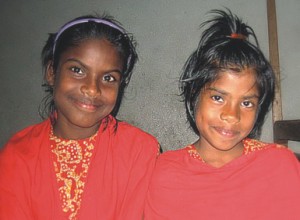Reflections
Educating Fatima
Andrew Morris
 |
Mohammad Azimuddin-making a life-changing decision for his daughters. |
So where was I? Oh yes, I was going to tell you about Fatima, the engaging eight-year old I met in Rangpur during my recent trip to visit Madhabi. You may recall that I wrote last year about an offhand remark made one day by Nisit, a teacher educator colleague of mine, to the man driving his rickshaw to work. “You should send your daughter to school” he'd said, then gone on to explain why. He'd thought nothing more of it, until a chance meeting a full three years later, where the same rickshaw driver proudly announced how he'd followed this advice, and how his daughter was now doing well at school.
On the one hand this is an everyday tale. Bangladesh has made great strides in recent years in terms of enrolling girls in primary school, and keeping them there. Primary education is compulsory, and so we should expect nothing less from families than to send their girls to school. Indeed, the access rate is over eighty per cent, and the retention rates through the primary years up to class five are upwards of ninety per cent. Free education and books and female stipend programmes have been effective incentives for everyone but the most remote and underserved communities. The country has long been awake to the multiple benefits of educating girls, from the basic question of the right to an education, to the positive consequences for family planning, for health care and financial prospects. Campaigns promoting the appointment of female teachers have also played a vital part in providing role models for young girls.
So far so good you can read this in any educational report, but of course such reports do not catch the nuances of decisions made by individual families, and the complexity of the choices before them. There are still pockets of the country where the old beliefs cling on tenaciously--the disdain for educating girls who will soon be married off anyway, thus trapping them in a cycle of illiteracy and poverty. The case of Madhabi herself, as I described last week, is ample evidence that not everyone is convinced by the bright and colourful campaigns to enrol girls, and those girls who slip through the net are rarely caught. So it's worth taking time to zoom in on this one family, and their decision, not without hardship of its own, to make this simple but vital change in the lives of their daughters.
Nisit and I are to be guests of honour this evening, and Mohammad Azimuddin, the rickshaw driver in question, stops on the journey home to buy some green coconut to serve us, along with a scented flower for each of us to hold. Through the winding streets of Rangpur, suddenly quiet now as the shops observe the dusk shut-down. Gone are the brightly-lit shop windows with saris in a hundred colours, and Hindi songs no longer blare from the CD shops. Passers-by emerge from the gloom and disappear down side-streets: there are only streetlights and the occasional hurricane lamp bobbing under the passing rickshaws. Crows in the trees lament the fading light, and the harsh jangle of bells provides a constant backdrop to our journey.
Azimuddin looks older than his 42 years suggest: I realise with some shock that we are in fact the same age but a life of pulling rickshaws as heavy as ploughs has taken its toll. This evening he sits with us, still glistening after pedalling for the forty-minute journey home. His shirt, once white, has seen its fair share of service. Still, his face glows with indomitable spirit, and a certain amount of pride at the decisions he has made in order to provide a brighter future for his family. And so it should, for he has single-handedly changed the entire path through life of his daughters, and they have rewarded him handsomely for his foresight and investment.
 |
Fatima and Kulsum |
The house is basic, with sparse furniture catering to elementary needs: a chair, a bare electric bulb, a gun-metal grey wardrobe, some plastic household implements hanging on hooks, mottled walls and the sole decoration provided by a picture adorned with Arabic calligraphy. The concrete floor is freshly swept. A kitten trots past, and a calf sleeps out in the entrance, next to the haystack under which the rickshaw is parked for the night. But despite the weak, flickering light, there is plenty of illumination provided by his two daughters, Fatima, and Kulsum, (6), who greet me in English and whose eyes are alive with curiosity and intelligence.
They have clearly prepared for our visit. Fatima begins to read, in English, from an impossibly erudite history of Bengal. She does so with surprising accuracy, but is clearly nervous of some of the more obscure words. So would I be. We gently suggest she reads from her own school books instead, and here she rediscovers her confidence, reciting fluently then launching into an immediate translation into Bangla. Kulsum reads to me in Bangla, her finger tracing rapidly across the page as she does so. Both are clearly very able, and have made the most of this chance their father has given them. Still, their future even now is not without obstacles. Fatima is struggling to pass the entrance exam to one of the more prestigious local schools. She is financially excluded from obtaining the ubiquitous coaching services which to some extent make a mockery of state provision of education, and so has already failed the admission test once. But she is undeterred, and determined to press on. She is now in 3rd place in her class, in which there are 129 other boys and girls.
Azimuddin, like many others, could have chosen to supplement his monthly income of $40 by packing them off to work in some distant middle-class family home, but he had other ideas. He and his veiled wife are both illiterate, and he was determined to avoid the same fate for his girls. “My daughters will do something for national development” he tells me. “They will be doctors and serve poor people.” Hearing this, it's hard to tell him what a fine decision he has made without a lump in your throat.
In addition to this he has scraped together Tk 300 to pay for their admission to a local music school. Both girls take turns at the harmonium to sing patriotic songs, and their surprisingly strong and confident voices ring out in the quiet evening. They've both won singing competitions and have heavy, serious prize books on the shelf to prove it.
As we set off, the family stand in the driveway. Nisit is left moved and a little sobered at the impact of that one casual piece of advice he gave. This is just one example of what can happen when people bridge the communication gap between the classes here, and talk to each other genuinely.
And of course it gives the lie to the frequently-heard idea that the working classes here don't know what's good for them. Mohammad Azimuddin, for one, is only too aware, and it is a pleasure to be able to celebrate his decision here, despite the challenges he and his daughters still face, and to acclaim the effort of his entire family in trying to make something of their lives.
Photos: Andrew Morris
Copyright (R) thedailystar.net 2007 |
